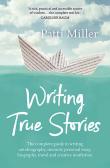'The complete guide to writing autobiography, memoir, personal essay, biography, travel and creative nonfiction.
'Writing True Stories is the essential book for anyone who has ever wanted to write a memoir or explore the wider territory of creative nonfiction. It provides practical guidance and inspiration on a vast array of writing topics, including how to access memories, find a narrative voice, build a vivid world on the page, create structure, use research-and face the difficulties of truth-telling.
'This book introduces and develops key writing skills, and then challenges more experienced writers to extend their knowledge and practice of the genre into literary nonfiction, true crime, biography, the personal essay, and travel and sojourn writing. Whether you want to write your own autobiography, investigate a wide-ranging political issue or bring to life an intriguing history, this book will be your guide.
'Writing True Stories is practical and easy to use as well as an encouraging and insightful companion on the writing journey. Written in a warm, clear and engaging style, it will get you started on the story you want to write-and keep you going until you reach the end.' (Publication summary)
 1702479852316947049.jpg
1702479852316947049.jpg
 Writing True Stories : The Complete Guide to Writing Autobiography, Memoir, Personal Essay, Biography, Travel and Creative Nonfiction
multi chapter work
Writing True Stories : The Complete Guide to Writing Autobiography, Memoir, Personal Essay, Biography, Travel and Creative Nonfiction
multi chapter work


